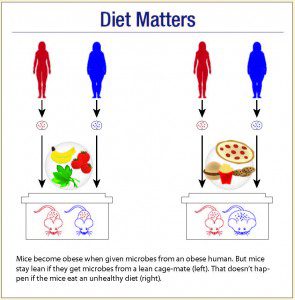As we struggle in the U.S. and across the globe to tackle obesity, we are aware that the Standard American Diet, it’s excesses and lack of activity are the main cause.
While we know that the right plant based diet and an active lifestyle will take pounds off, this article provides an interesting twist to something we don’t normally think about.
Fattening Microbes?
Can our gut bacteria help explain why we’re fat or thin?
Bonnie Liebman • December 11, 2013
Posted in Diet and Weight Loss.
In one of the latest advances in learning why some of us put on weight, scientists studied gut bacteria from pairs of twins in which one sibling was lean and one was obese. They transplanted the lean twin’s bacteria into one group of mice and the obese twin’s bacteria into another.
A month later, the mice that got the lean twin’s bacteria were still lean. But the mice that got the obese twin’s bacteria were fatter, even though they ate no more food.
Next came what the scientists called “the battle of the microbiota.”
They housed each mouse that had been given what one could call the “slimming microbes” in a cage with a mouse that had been given the “fattening microbes.” (The mice had received the microbes only five days earlier, so those given the fattening microbes hadn’t yet gained weight.)
Since mice eat each others’ feces, their gut microbes got mixed. Which microbes won?
The slimming ones. They invaded the mice with fattening microbes, so all the mice stayed lean. One explanation: mice with fattening microbes (and obese people) have fewer and less diverse microbes in their gut than mice with slimming microbes (and lean people).
“We think the lack of diversity leaves open niches…that can be filled by microbes associated with leanness,” explained Jeffrey Gordon, director of the Center for Genome Sciences & Systems Biology at Washington University in St. Louis, accord¬ing to the university’s Web site.
But there’s a catch: the slimming microbes invaded mice with fattening microbes only if the mice with fattening microbes ate a diet that’s high in fruits and vegetables and low in saturated fat.
“Eating a healthy diet encourages microbes associated with leanness to quickly become incorporated into the gut,” says Gordon. A diet high in saturated fat and low in fruits and vegetables “thwarts the invasion.”
Of course, mice aren’t humans. But preliminary findings in people are intriguing.
For example, some studies find that Bacteroidetes bacteria are more common in lean people, while Firmicutes bacteria are more common in the obese, though other studies disagree. What’s more:
• Researchers put 12 obese people on a low-calorie diet for a year. As they lost weight, they acquired Bacteroidetes and lost Firmicutes.
• Scientists overfed 12 lean and 9 obese people for three days. Bacteria didn’t change in the obese people, but when the lean people ate 3,400 calories a day, their Firmicutes increased and their Bacteroidetes decreased.
What’s more, the lean overfed people who had a 20 percent increase in Firmicutes—and a 20 percent drop in Bacteroidetes—absorbed 150 more calories per day from their food.
How do microbes affect weight gain? The bacteria in Gordon’s lean mice digested more fiber, so they gave off more short-chain fatty acids than the bacteria in the obese mice. Short-chain fatty acids may cause less fat to accumulate in fat cells, boost calorie burning, and increase satiety hormones.
“It’s often harder to translate results across species than you might expect,” cautions co-author Rob Knight, a microbiologist at the University of Colorado.
“But it’s possible that we could eventually prevent or treat obesity by giving people the right microbes and the right diet.”
Sources: Science 341: 1079, 2013; Nature 457: 480, 2009; Science 341: 1069, 2013; Nature 444: 1022, 2006; Am. J. Clin. Nutr. 94: 58, 2011.


